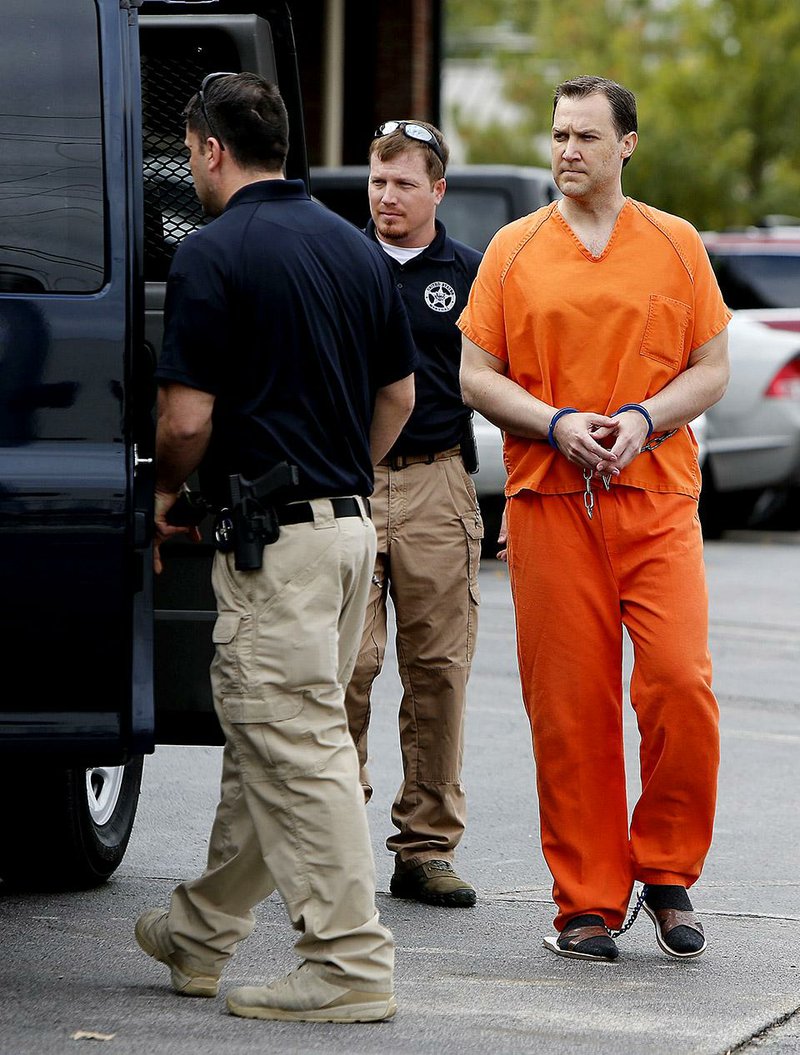FORT SMITH -- The $450,000 restitution a federal judge has ordered former Northwest Arkansas developer Brandon Barber to pay is a fraction of the $16.2 million for which the government had argued that Barber should be held responsible.
U.S. District Judge P.K. Holmes III ruled Wednesday that Barber should pay $450,000 from the $550,000 that he and other conspirators pocketed from a loan kickback scheme in 2008.
Barber, 38, was sentenced Oct. 28 to five years and five months in prison on a July 2013 guilty plea to charges of conspiracy to commit bankruptcy fraud, money laundering and conspiracy to commit bank fraud. Holmes ordered a Jan. 5 hearing at that time to take up the question of restitution.
Barber's attorney, Asa Hutchinson III of Rogers, said Thursday that he thought Holmes did a good job on the restitution ruling.
"I think he did a thorough, detailed analysis of the facts and appropriately determined the amount of victim loss was $450,000," Hutchinson said.
Hutchinson had argued that his client should pay $550,000 in restitution because that was the amount of loss in the First Federal Bank of Fayetteville loan case to which he pleaded guilty.
U.S. Attorney Conner Eldridge said Thursday that he "respectfully disagreed" with Holmes' ruling.
"We believe the evidence we presented was the result of a lengthy investigation that showed Brandon Barber committed fraud and caused significant losses to the financial institutions involved," he said.
Eldridge said his office was considering all the facts and circumstances before deciding whether to appeal Holmes' ruling.
He added that all of the financial institutions involved in the Barber case, including the two for which Holmes ruled against the government, had civil judgments against Barber and were pursuing collections in those cases.
According to federal court records, Springdale builder Jeff Whorton inflated the value of his Executive Plaza property in Springdale for a loan obtained by developer Gary Combs so that Combs and developer Brandon Rains could buy the property.
Combs died in 2012. Rains pleaded guilty in 2013 to lying to federal agents and was fined $5,000.
The amount of the loan by which the land was overvalued was kicked back to the conspirators, including Barber.
Holmes ordered Whorton in a Jan. 14 hearing to pay $100,000 restitution from the First Federal Bank loan as part of his sentence, leaving the remaining $450,000 for Barber to repay.
Whorton, who has multiple health problems, was sentenced to 14 months of home detention and fined $10,000 after pleading guilty in August 2013 to conspiracy to commit bank fraud and money laundering.
Barber has been in federal custody since June 2013 after violating conditions of his pretrial release.
Hutchinson said Barber soon will be transferred to Camp Fort Lewisburg, a federal prison in northeast Pennsylvania.
He said the prison was appropriate for Barber's risk level and will put him close to his family in New York City.
The government had argued to Holmes that Barber should be ordered to pay more than $7.4 million from a loan from Legacy Bank in Springdale and nearly $8.2 million from a loan by Enterprise Bank of St. Louis, as well as the $550,000 from the First Federal Bank loan.
Holmes wrote in his 16-page restitution order that the government failed to provide any evidence of the alleged misrepresentations Barber made to the Legacy and Enterprise banks to induce their officials to lend him money. The government also did not prove that the banks suffered a loss because of the alleged misrepresentations, Holmes ruled.
"The government had a wealth of financial records at their disposal, but it appears that in the more than two years since the allegations of misrepresentations were made, no cross-referencing was ever conducted to verify what specific misrepresentations Barber may have made to Legacy and/or Enterprise," Holmes wrote.
In its briefs filed for restitution, Holmes wrote, the government relied on statements in the probation office's pre-sentence report, but those statements were lifted from the 27-count indictment the government brought against Barber, associate James Van Doren of New York City and Barber attorney K. Vaughn Knight of Fayetteville.
Holmes' restitution order included a passage from the pre-sentence report that said Barber provided false personal financial information and statements that overstated his net worth, overstated his cash on hand, understated his liabilities, and overvalued his ownership interest in the various companies and partnerships he listed on the personal financial statement.
The passage also said Barber submitted false statements on his status with other financial institutions and, once being approved for the loans, used proceeds for purposes other than those laid out in the loan terms.
None of the approximately $15.6 million the government wanted Barber to pay from the Legacy and Enterprise loans was associated with offenses to which he pleaded guilty in July 2013, Holmes wrote.
Holmes wrote that because the government sought restitution for alleged offenses to which Barber did not plead guilty, it had to "come forward with evidence to show a sufficient factual basis by a preponderance of the evidence."
The charges to which he pleaded guilty related to Barber conspiring with Knight and Van Doren to hide more than $1 million from the U.S. Bankruptcy Court; laundering $64,000 through Van Doren to hide it from creditors; and participating in the kickback scheme in the First Federal Bank loan.
Van Doren pleaded guilty in August 2013 to one count of money laundering. He was sentenced Nov. 3 to 15 months in prison and fined $10,000.
A federal court jury in Fort Smith convicted Knight in November 2013 of conspiracy to commit bankruptcy fraud, bankruptcy fraud, making false statements and five counts of money laundering. In June, Holmes threw out the convictions on seven of the eight charges and ordered a new trial. He acquitted Knight of the false statement charge.
The government has appealed Holmes ruling in the Knight case to the 8th Circuit Court of Appeals.
NW News on 01/23/2015

